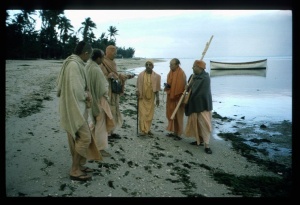CC Madhya 13.185 (1975): Difference between revisions
(Vanibot #0027: CCMirror - Mirror CC's 1996 edition to form a basis for 1975) |
(Vanibot #0020: VersionCompareLinker - added a link to the Version Compare feature) |
||
| Line 2: | Line 2: | ||
<div style="float:left">'''[[Sri Caitanya-caritamrta (1975)|Śrī Caitanya-caritāmṛta (1975)]] - [[CC Madhya (1975)|Madhya-līlā]] - [[CC Madhya 13 (1975)|Chapter 13: The Ecstatic Dancing of the Lord at Ratha-yātrā]]'''</div> | <div style="float:left">'''[[Sri Caitanya-caritamrta (1975)|Śrī Caitanya-caritāmṛta (1975)]] - [[CC Madhya (1975)|Madhya-līlā]] - [[CC Madhya 13 (1975)|Chapter 13: The Ecstatic Dancing of the Lord at Ratha-yātrā]]'''</div> | ||
<div style="float:right">[[File:Go-previous.png|link=CC Madhya 13.184 (1975)|Madhya-līlā 13.184]] '''[[CC Madhya 13.184 (1975)|Madhya-līlā 13.184]] - [[CC Madhya 13.186 (1975)|Madhya-līlā 13.186]]''' [[File:Go-next.png|link=CC Madhya 13.186 (1975)|Madhya-līlā 13.186]]</div> | <div style="float:right">[[File:Go-previous.png|link=CC Madhya 13.184 (1975)|Madhya-līlā 13.184]] '''[[CC Madhya 13.184 (1975)|Madhya-līlā 13.184]] - [[CC Madhya 13.186 (1975)|Madhya-līlā 13.186]]''' [[File:Go-next.png|link=CC Madhya 13.186 (1975)|Madhya-līlā 13.186]]</div> | ||
{{CompareVersions|CC|Madhya 13.185|CC 1975|CC 1996}} | |||
{{RandomImage}} | {{RandomImage}} | ||
==== TEXT 185 ==== | ==== TEXT 185 ==== | ||
| Line 37: | Line 36: | ||
:pāraṁ paraṁ jigamiṣor bhava-sāgarasya | :pāraṁ paraṁ jigamiṣor bhava-sāgarasya | ||
:sandarśanaṁ viṣayiṇām atha yoṣitāṁ ca | :sandarśanaṁ viṣayiṇām atha yoṣitāṁ ca | ||
:hā hanta hanta viṣa-bhakṣaṇato | :hā hanta hanta viṣa-bhakṣaṇato 'py asādhu | ||
([[CC Madhya 11.8]]) | |||
The word niṣkiñcanasya refers to a person who has finished his material activities. Such a person can begin to execute his activities in Kṛṣṇa consciousness to cross over the ocean of nescience. It is very dangerous for such a person to have intimate relationships with mundane people or to become intimately related with women. This formality is to be observed by anyone who is serious about going back home, back to Godhead. To teach His personal associates these principles, Śrī Caitanya Mahāprabhu expressed external anger when touched by the King. Since the Lord was very satisfied with the humble behavior of the King, He intentionally allowed the King to touch Him, but externally He expressed anger just to warn His personal associates. | |||
The word niṣkiñcanasya refers to a person who has finished his material activities. Such a person can begin to execute his activities in Kṛṣṇa consciousness to cross over the ocean of nescience. It is very dangerous for such a person to have intimate relationships with mundane people or to become intimately related with women. This formality is to be observed by anyone who is serious about going back home, back to Godhead. To teach His personal associates these principles, Śrī Caitanya Mahāprabhu expressed external anger when touched by the King. Since the Lord was very | |||
</div> | </div> | ||
Latest revision as of 07:42, 27 January 2020

A.C. Bhaktivedanta Swami Prabhupada
TEXT 185
- tathāpi āpana-gaṇe karite sāvadhāna
- bāhye kichu roṣābhāsa kailā bhagavān
SYNONYMS
tathāpi—still; āpana-gaṇe—to personal associates; karite—to do; sāvadhāna—warning; bāhye—externally; kichu—some; roṣa-ābhāsa—apparent anger; kailā—showed; bhagavān—the Supreme Personality of Godhead.
TRANSLATION
However, just to warn His personal associates, the Supreme Personality of Godhead, Śrī Caitanya Mahāprabhu, externally expressed feelings of anger.
PURPORT
When Mahārāja Pratāparudra asked to see the Lord, Śrī Caitanya Mahāprabhu immediately refused, saying:
- niṣkiñcanasya bhagavad-bhajanonmukhasya
- pāraṁ paraṁ jigamiṣor bhava-sāgarasya
- sandarśanaṁ viṣayiṇām atha yoṣitāṁ ca
- hā hanta hanta viṣa-bhakṣaṇato 'py asādhu
(CC Madhya 11.8) The word niṣkiñcanasya refers to a person who has finished his material activities. Such a person can begin to execute his activities in Kṛṣṇa consciousness to cross over the ocean of nescience. It is very dangerous for such a person to have intimate relationships with mundane people or to become intimately related with women. This formality is to be observed by anyone who is serious about going back home, back to Godhead. To teach His personal associates these principles, Śrī Caitanya Mahāprabhu expressed external anger when touched by the King. Since the Lord was very satisfied with the humble behavior of the King, He intentionally allowed the King to touch Him, but externally He expressed anger just to warn His personal associates.